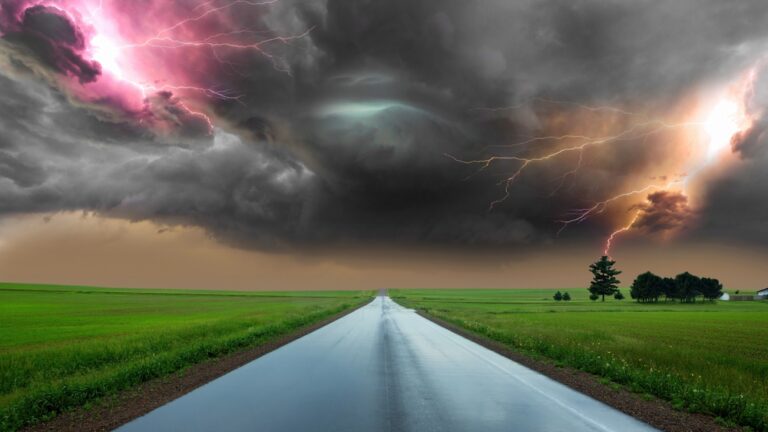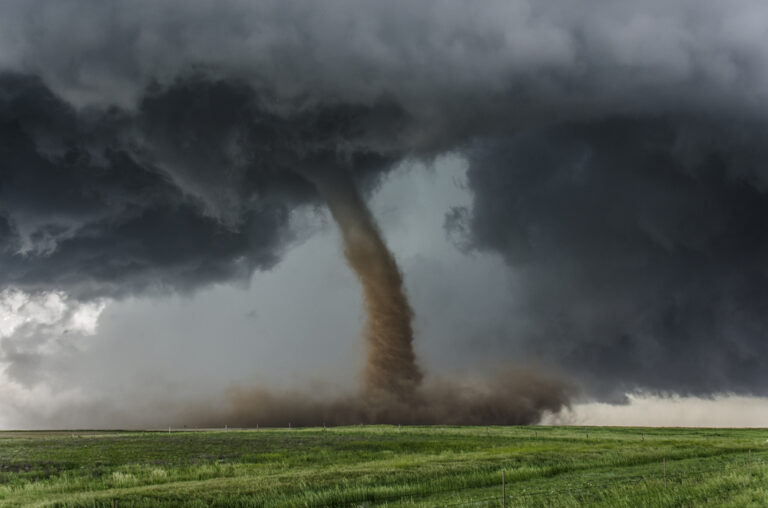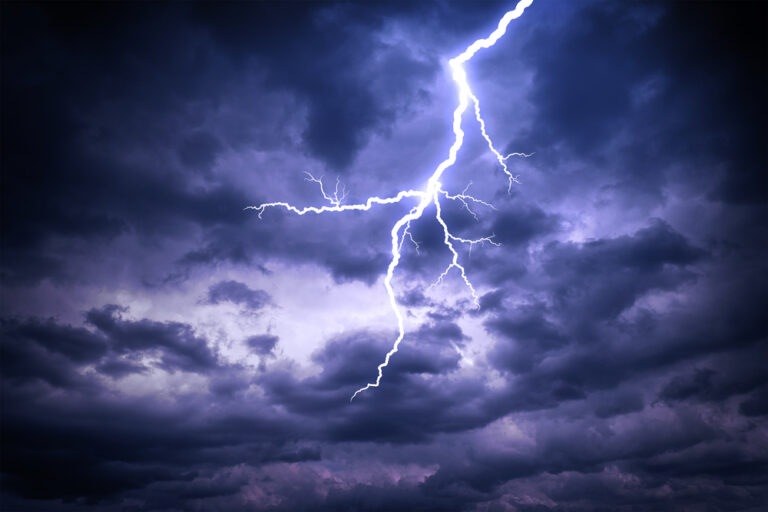
You can plan for a great RV trip with family or friends, but you can’t really plan for severe weather. Thunderstorms, hail, and even tornadoes are an unfortunate reality when you’re out road tripping, especially in the summer months, though they can happen at any time and in any place. And they can come on quickly. One moment it’s a beautiful sunny day, and the next moment you’re rushing inside to avoid the first few fat raindrops. (The calm before the storm, indeed!)
When it comes to severe weather, the old Boy Scout motto, “be prepared”, is the best advice you can heed. Beyond that, there are a number of things you can do to stay safe and dry when severe weather hits. Here are 9 RV weather tips to remember for your next camping trip.

#1. Stay Informed
There’s usually at least a few hours notice before a really bad storm hits. With today’s radar and weather tracking technology, there’s absolutely no reason to be surprised when the wind starts swirling and the thunder starts booming. If you’ve got an internet connection or a smartphone, check weather websites or use a weather forecast app to see what’s in store for the day. If it looks like things could get bad, check back frequently for warnings or approaching storm systems.
#2. Bring things inside and batten down the hatches
Grills, chairs, and anything else that you’ve got set up outside can get blown around and potentially cause other damage during a bad storm. The safest thing to do is secure them or put them away. Similarly, your awning should be rolled up to prevent damage.
#3. Have an emergency bag
Remember, if you have to leave your vehicle due to extreme weather, you probably won’t have much time to gather belongings, and you certainly can’t take all of your possessions with you. Instead, have a backpack or other type of bag ready to go. It should contain any important documents you’ve brought with you, enough necessary medication for a few days, a few bottles of water, some nonperishable food, cell phone chargers, and anything else you can’t live without for a few days.
#4. Know where to go if the weather gets bad
RVs can protect you from the elements to a certain degree, but in truly severe situations (like a tornado or a storm with straight-line winds), you will want to seek shelter in a more stable and secure place. When you park at a campsite, take a few minutes to find the location of the nearest storm shelter, and have a plan in place to get there should the National Weather Service issue warnings.

#5. Know the evacuation route
Flash floods, wildfires, and other conditions can require residents and guests in a given area to evacuate at a moment’s notice. When you arrive at your stopping point for the night, week, or longer, be sure to look into the evacuation routes.
#6. If you’re on the road and a tornado is in the vicinity, park your vehicle quickly in a spot that’s out of the way.
The Storm Prediction Center advises against parking under bridges or overpasses, as this can put you in the path of flying debris and cause traffic to back up in a dangerous spot. Once parked, get as low in the vehicle as you can (definitely below the windows), and cover your head with a blanket or jacket.
#7. Or, if you are able to get to ground that’s considerably lower than the roadway, it’s advisable to get out of your vehicle and move down to the lower area.
Then, lie down with your hands over your head. This is probably not advisable, however, if the tornado storm is a particularly rain-soaked one, as lower areas can flood quickly. Use your best judgment in these situations.
#8. Use common sense
This may be one of the most important RV weather tips. If there’s a looming threat of severe weather, plan activities that will keep you out of the elements and in a safe, sheltered place. Nearby museums, shopping, or other places that keep a roof over your head are the best options. And of course, planning an all-day hike in the wilderness when you know the weather has the potential to turn nasty simply isn’t a smart idea.
#9. Don’t take chances
It’s never, ever worth it.
Stay Safe!
Severe weather can put a real damper on your camping and outdoor fun, but it doesn’t have to put you in any danger. By being prepared and knowing how to react in case extreme systems do pop up on the radar, you’re more likely to ride out the storms with minimal disruption to your life. Know what’s going on weather wise, have a plan in place, and use your best judgment.
The good news is that severe weather typically doesn’t last very long. Still, it does happen. By following these RV weather tips, you’ll be in great shape the next time the wind starts howling at your RV’s door.






